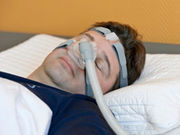Non-weight gainers have higher leptin levels, lower ghrelin levels, and higher eating behavior scores
WEDNESDAY, March 16, 2016 (HealthDay News) — For patients with obstructive sleep apnea (OSA), initiation of continuous positive airway pressure (CPAP) is associated with a reduction in basal metabolic rate (BMR), according to a study published online March 1 in the American Journal of Respiratory and Critical Care Medicine.
Ryo Tachikawa, M.D., Ph.D., from Kyoto University in Japan, and colleagues examined the mechanisms by which OSA patients gain weight after CPAP initiation. A comprehensive evaluation of energy metabolism was conducted in 63 participants with newly diagnosed OSA (51 men), CPAP initiation, and three-month follow-up. Participants underwent polysomnography, body weight, body composition, BMR, hormones, dietary intake, eating behavior, and physical activity measurements.
The researchers found that after CPAP there was a significant decrease in BMR (P < 0.001), but no change in physical activity or total caloric intake. Baseline apnea-hypopnea index, change in urine norepinephrine, and CPAP adherence were identified as significant predictors for the change in BMR in multivariate regression. Compared with non-weight gainers, weight gainers had higher leptin levels, lower ghrelin levels, and higher eating behavior scores. Increased caloric intake was a particularly significant predictor of weight gain among parameters related to energy metabolism.
“Although a reduction in BMR after CPAP predisposes to a positive energy balance, dietary intake and eating behavior had greater impacts on weight change,” the authors write. “These findings highlight the importance of lifestyle modifications combined with CPAP.”
One institution received funding from pharmaceutical and technology companies.
Full Text (subscription or payment may be required)
Copyright © 2016 HealthDay. All rights reserved.








